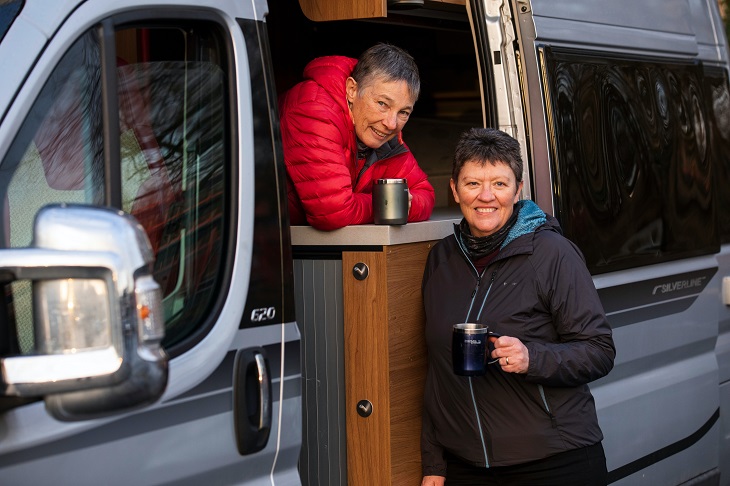Retirement on the Road: A Comprehensive Guide to Disabled Parking for Seniors

Navigating the intricacies of parking regulations and accessibility can be a challenging task, especially for seniors with mobility challenges. In this comprehensive guide, we’re aiming to provide valuable information on disabled parking for seniors, including disabled parking permits, designated spaces, and the various considerations that seniors and their caregivers should keep in mind. By understanding the nuances of disabled parking, seniors can enhance their mobility and enjoy greater independence in their daily lives. From California senior citizen handicap parking regulations to Georgia senior citizen parking permit requirements to Arizona parking tips for seniors with limited mobility, we’ll be covering everything you need to know!
Senior Citizen Handicap Parking Benefits
Senior citizens facing mobility challenges find indispensable benefits in the availability of handicap parking spaces. These designated spots, strategically positioned near building entrances, serve as a lifeline for elderly individuals, reducing the physical strain associated with traversing expansive parking lots. One of the primary advantages lies in the wider parking spaces, accommodating seniors as they enter and exit vehicles with comfort and ease, particularly if they rely on mobility aids such as walkers or canes. The proximity of these spaces to entrances ensures that seniors can access essential services, fostering a sense of independence and self-sufficiency. Handicap parking benefits for seniors extend beyond mere convenience; they contribute significantly to safety by minimizing the risk of accidents and falls in crowded parking areas.
Access to these spaces is facilitated through disabled parking permits, such as placards or license plates, providing exclusive privileges for seniors. The convenience and safety offered by handicap parking contribute to a more inclusive environment, acknowledging and catering to the unique needs of elderly individuals. Overall, senior citizens experience enhanced mobility and a higher quality of life, thanks to the thoughtful allocation of handicap parking spaces that prioritize their well-being and independence.
Accessible Parking for Elderly Drivers
Accessible parking for elderly drivers is of paramount importance, serving as a critical component in ensuring their continued independence and well-being. These designated parking spaces are thoughtfully designed to go beyond mere convenience, addressing the specific needs of elderly individuals facing mobility challenges. The wider dimensions of these parking spots provide ample space for seniors to comfortably enter and exit their vehicles, accommodating mobility aids such as walkers or canes. Moreover, the proximity to building entrances reduces the physical strain on elderly drivers, minimizing the risk of fatigue and potential accidents in busy parking lots. Accessible parking is essential for fostering a sense of autonomy, enabling elderly drivers to navigate daily life with greater ease and confidence.
Incorporating accessible parking spaces is a testament to society’s commitment to inclusivity and respect for the aging population. By recognizing the unique needs of elderly drivers, accessible parking not only facilitates their mobility but also promotes safety and reduces barriers to participation in various community activities. As our society ages, the importance of accessible parking for elderly drivers becomes increasingly evident, contributing to a more compassionate and supportive environment that values the dignity and independence of our senior citizens.
Handicap Parking Options for Seniors
Seniors facing mobility challenges have a range of handicap parking options tailored to meet their unique needs and enhance their overall quality of life. One primary solution comes in the form of disabled parking permits, such as placards or license plates, providing exclusive access to designated handicap parking spaces. These permits are typically granted based on specific eligibility criteria, which may consider age and mobility restrictions. Seniors can also explore time-limited parking zones designed to accommodate their needs, allowing for extended periods without the concern of receiving citations.
These options empower seniors with disabilities to choose the solution that best aligns with their lifestyle, ensuring that they can access essential services and activities with greater ease. By leveraging handicap parking options, seniors not only experience increased convenience but also gain a sense of inclusivity and consideration from their communities, fostering a more supportive and accessible environment for older individuals facing mobility challenges. Ultimately, these options play a crucial role in promoting independence and mobility for seniors, acknowledging their unique requirements in the realm of parking accessibility.

Senior-Friendly Disabled Parking Spaces
Senior-friendly disabled parking spaces play a vital role in addressing the distinct needs of elderly individuals with mobility challenges, ensuring a safe and convenient parking experience. These spaces are thoughtfully designed to involve several key features that enhance accessibility for seniors. Typically, they are wider than standard parking spaces, providing ample room for seniors to maneuver and exit their vehicles comfortably, especially if they use mobility aids.
Clear and visible signage is a crucial aspect, aiding seniors in easily identifying designated parking spots. Maintenance of pathways and surfaces is prioritized to ensure a smooth and hazard-free journey from the parking area to building entrances. Proximity to entrances is another essential consideration, minimizing the distance seniors need to traverse and reducing physical strain. These senior-friendly disabled parking spaces contribute to a more inclusive environment by acknowledging and accommodating the unique requirements of elderly individuals.
By incorporating these thoughtful features, communities can create spaces that not only comply with accessibility standards but also prioritize the well-being and independence of seniors, fostering a supportive and considerate atmosphere for those facing mobility challenges.
Elderly Parking Permit Eligibility
Elderly parking permit eligibility is typically determined based on specific criteria designed to address the unique needs of seniors facing mobility challenges. In most jurisdictions, eligibility revolves around age and mobility restrictions. Seniors experiencing difficulty walking a certain distance without assistance or those with age-related conditions that impede mobility often qualify for these permits. The application process may require documentation, such as a doctor’s certification or medical records, to verify the applicant’s eligibility. Understanding and meeting these criteria is crucial for seniors seeking to obtain a parking permit tailored to their needs.
These permits, often in the form of placards or license plates, grant exclusive access to designated handicap parking spaces, reducing the physical strain associated with parking and enhancing overall mobility. Elderly parking permit eligibility criteria vary by location (Florida elderly parking permit eligibility may differ from Pennsylvania seniors’ accessible parking regulations, and so on from state to state!). For this reason, it’s important to stay informed about local regulations to ensure that seniors can access the benefits provided by these permits, contributing to a more inclusive and accommodating environment for the aging population.
Best Parking Solutions for Senior Citizens with Disabilities
The best parking solutions for senior citizens with disabilities encompass a range of options that prioritize accessibility and convenience. Securing a disabled parking permit, such as a placard or license plate, stands out as a key solution, providing exclusive access to designated handicap parking spaces. These spaces are strategically located near entrances, minimizing the distance seniors with disabilities need to cover and reducing physical strain. Exploring alternative parking options, such as valet services or accessible parking lots, can offer added flexibility and convenience for seniors. Accessible transportation services, like shuttle services from parking areas to main entrances, can further enhance mobility.
Vehicle modifications, such as ramps or swivel seats, cater to seniors with specific mobility needs, enabling them to enter and exit their vehicles with greater ease. Tailoring parking solutions to individual circumstances ensures that senior citizens with disabilities can navigate parking challenges effectively, promoting independence and a more comfortable lifestyle.
The best parking solutions for senior citizens may vary from state to state; Michigan disabled parking options for senior citizens may differ from Illinois best parking solutions for senior citizens with disabilities, and so on throughout the US. Overall, however, a combination of permit privileges, alternative parking options, and thoughtful vehicle modifications contributes to a comprehensive approach that addresses the diverse needs of senior citizens with disabilities, fostering a more accessible and inclusive environment.
Seniors and Accessible Parking Regulations
Navigating accessible parking regulations is crucial for seniors seeking to maximize the benefits of designated spaces and ensure compliance with local laws. Seniors should be aware of specific rules governing disabled parking permits, including when and where they can be utilized. Understanding the duration limits for parking and any associated fines or penalties for misuse is essential. Familiarity with the eligibility criteria for obtaining a senior parking permit, often based on age and mobility restrictions, is paramount. Additionally, recognizing the significance of accessible parking signage and adhering to designated spaces is vital for maintaining an inclusive and respectful community environment.
Seniors should stay informed about any updates or changes in local regulations to ensure continued compliance and access to the privileges afforded by disabled parking permits. By being knowledgeable about accessible parking regulations, seniors can advocate for their needs, contribute to a more inclusive community, and enjoy the convenience and support provided by these important parking accommodations.
Mobility Assistance for Elderly Drivers
From Oregon to Ohio, mobility assistance for elderly drivers plays a pivotal role in enhancing seniors’ driving experience and maintaining independence. As individuals age, physical limitations may arise, impacting their ability to navigate vehicles comfortably. Vehicles equipped with features such as swivel seats, hand controls, and ramps are transformative in facilitating accessibility for elderly drivers with mobility challenges. Swivel seats provide ease of entry and exit, reducing strain on joints, while hand controls offer alternative methods for acceleration and braking, accommodating those with diminished lower body mobility. Ramps ensure seamless transitions in and out of vehicles for seniors using mobility aids.
Beyond vehicle modifications, the availability of parking spaces close to entrances and accessible pathways further contributes to a senior-friendly driving experience. Mobility assistance not only fosters a sense of confidence and security behind the wheel but also extends the duration of safe and independent driving for elderly individuals. As our population ages, prioritizing and investing in such mobility solutions becomes increasingly important to promote continued autonomy for elderly drivers, allowing them to engage in daily activities and maintain a sense of control over their lives.

Senior Citizen Parking Permit Requirements
Senior citizen parking permit requirements are essential criteria that seniors must fulfill to obtain the valuable privileges associated with designated parking spaces. Typically, eligibility for these permits is based on age and mobility considerations, as seniors experiencing challenges in walking a certain distance without assistance are the primary beneficiaries.
The application process often involves submitting supporting documentation, such as a doctor’s certification or medical records, to verify the applicant’s eligibility. The age threshold for senior citizen parking permits may vary by location, and it is crucial for seniors to be aware of the specific requirements set forth by their local authorities.
Acquiring a senior parking permit, usually in the form of a placard or license plate, grants exclusive access to handicap parking spaces, which are strategically located near entrances to minimize physical strain. By adhering to the senior citizen parking permit requirements, elderly individuals can ensure they have the necessary documentation to access these parking privileges, contributing to a more accessible and accommodating environment that addresses the unique needs of seniors with mobility challenges.
Parking Tips for Seniors with Limited Mobility
Parking tips for seniors with limited mobility are instrumental in navigating daily challenges and ensuring a safe and convenient experience. Here are our top tips:
- Choosing accessible parking spaces strategically located near entrances can significantly reduce the distance seniors need to walk, minimizing physical strain.
- Leveraging disabled parking permits, such as placards or license plates, provides exclusive access to designated handicap spaces, enhancing convenience.
- Planning trips during off-peak hours can increase the likelihood of finding available parking spaces.
- Familiarizing oneself with local parking regulations ensures compliance and prevents potential fines.
- Utilizing valet services when available can eliminate the need for extended walks through parking lots.
- Seeking assistance from caregivers or utilizing mobility aids, such as walkers or canes, can enhance stability and support during the parking process.
- Regularly updating oneself on the location of accessible parking spaces and any changes in regulations contributes to a smoother parking experience.
Adopting these parking tips empowers seniors with limited mobility, promoting independence and reducing the physical challenges associated with parking, thus enabling a more comfortable and stress-free daily life.
***
We hope this guide has shed some light on the importance of disabled parking for seniors and has provided a roadmap for navigating the complex landscape of parking regulations. By obtaining and utilizing disabled parking permits, seniors can significantly improve their access to essential services, reduce the physical strain of navigating parking lots, and enhance their overall quality of life. Remember, the journey towards accessible parking is a shared responsibility, and with increased awareness, we can create a more inclusive environment for our senior community.
Need more info on everything from Texas accessible parking for elderly drivers to New York senior-friendly disabled parking spaces? Check out the Dr Handicap site for tons more insights!
Featured image by Pixabay on Pexels